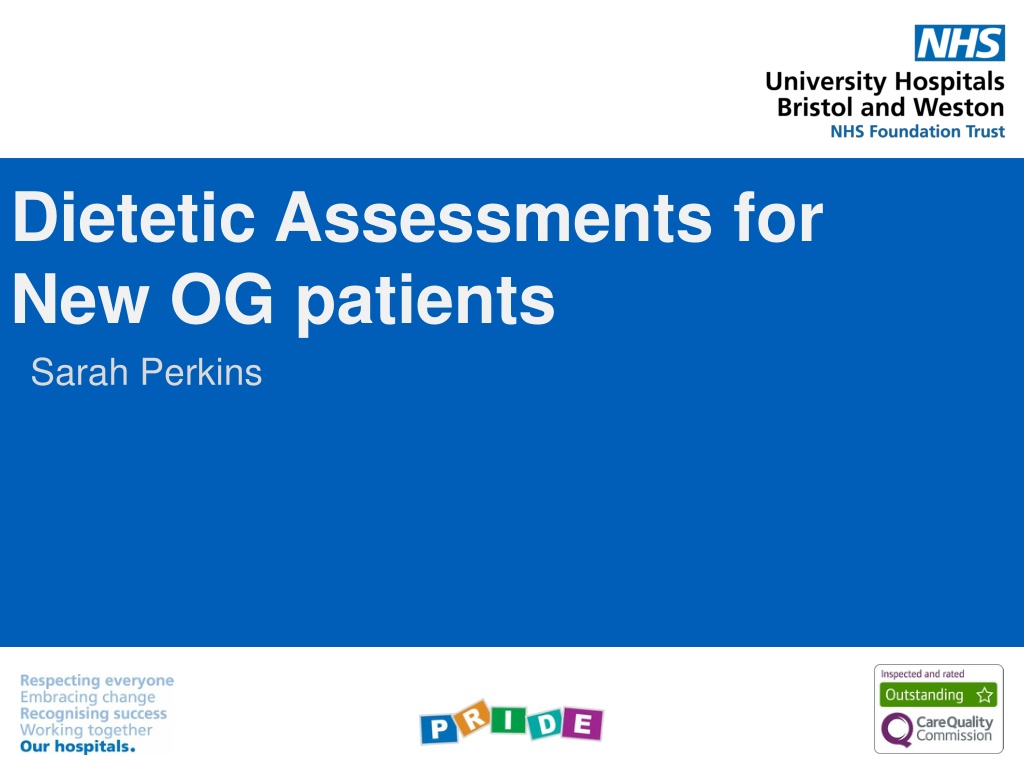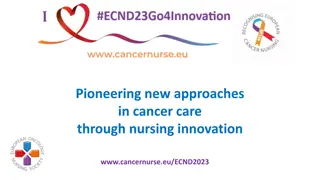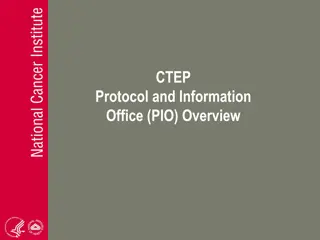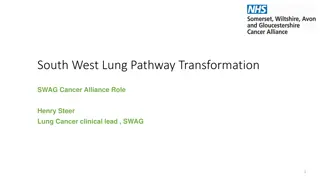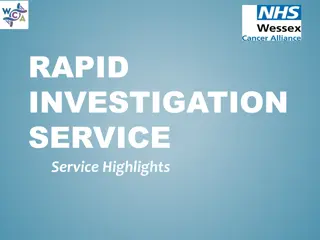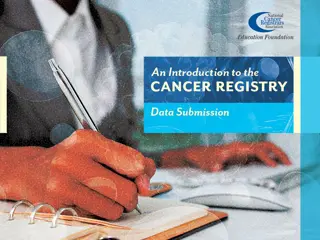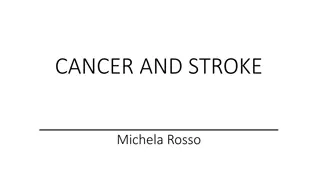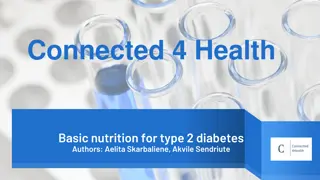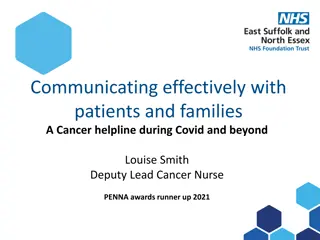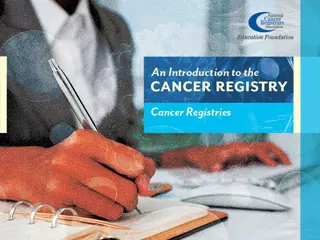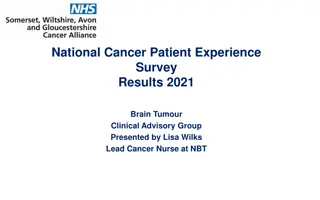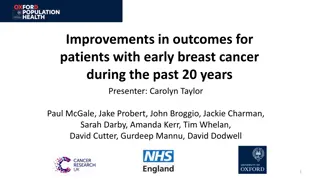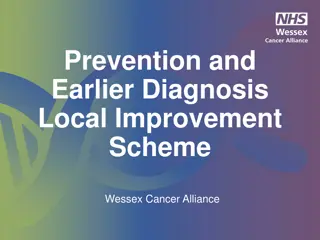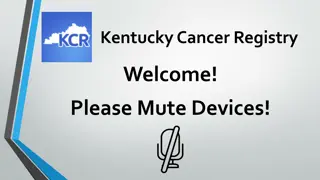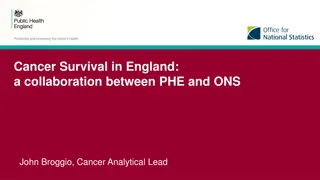Optimizing Nutritional Support for Upper GI Cancer Patients: Insights and Strategies
High prevalence of malnutrition in upper GI cancer patients highlights the importance of early nutritional screening and intervention. The role of prehab clinics in enhancing outcomes is gaining momentum. Insights from previous experience in nutritional screening reveal both advantages and challenges. Discussions on integrating early nutritional assessment at UHBW and its application in other centers raise questions about potential disparities within SWAG. The Liver Reducing Diet in upper GI surgery aims to deplete liver glycogen and reduce operative risks. Evidence base largely focuses on bariatric surgery and cholecystectomy patients.
Download Presentation

Please find below an Image/Link to download the presentation.
The content on the website is provided AS IS for your information and personal use only. It may not be sold, licensed, or shared on other websites without obtaining consent from the author. Download presentation by click this link. If you encounter any issues during the download, it is possible that the publisher has removed the file from their server.
E N D
Presentation Transcript
Dietetic Assessments for New OG patients Sarah Perkins
Background High percentage of malnourished patients at presentation of OG cancer Evidence that nutritional screening risk can predict likelihood of surgical complications Role of prehab clinics gaining momentum in UK, with Macmillan developing resources for prehab services Would early formalised nutritional screening and Dietetic intervention help implement nutritional support sooner and improve outcomes?
Previous experience: Nutritional screening in Head and Neck MDT clinic Advantages Challenges Establish early relationship with patients Identify malnutrition risk early on Possible role for healthy weight loss in obese cohort Allowed tracking of weight history and monitoring Patients awaiting diagnosis couldn t take in information Resourcing for time and data entry Unable to see everyone Patient privacy and space for conversations
Discussion How do we see early nutritional assessment fitting into pathways at UHBW? How does it work in other centres? Is there any disparity within SWAG?
The Liver Reducing Diet in Upper GI Surgery Sarah Perkins
Background The liver reducing diet is a restrictive very low calorie diet (~1000kcal/day) designed to deplete liver glycogen stores and fatty infiltration pre- surgery 1000kcal/day likely represents 25-50% nutritional requirements in obese patient group Usually 1-3 weeks in duration Aim is to shrink the liver to reduce the risk of bleeding/ operative complications, but weight loss is usually a side effect, although not the primary aim of the diet Evidence base is in bariatric surgery and obese cholecystectomy patients
Evidence Library literature search Majority of papers bariatric surgery and cholecystectomy Some papers on liver cirrhosis/ ALD/ NAFLD 1 paper on OG surgery in general An investigation into the current nutritional management of patients undergoing upper gastrointestinal surgery (Molloy et al. 2020) Questionnaire from UK OG Dietitians showed majority of approach around high energy and protein nutritional support but 86% also using liver shrinkage diets when requested likely for cholecystectomy
UHBW practice Original remit was the liver reducing diet sheet provided in pre-op assessment for patients with BMI >40kg/m2 undergoing cholecystectomy Diet to be followed for two weeks prior to surgery UHBW and NBT Dietetic teams have noticed the diet being more widely applied in OG surgery e.g. oesophagectomy patients Is there a place for this?
Possible benefits Obesity is a widespread problem and a risk factor for oesophageal adenocarcinoma Obesity increases risk of surgical complications Ideally want patients to be as fit as possible for surgery, and be a healthy weight The liver reducing diet is likely to cause rapid weight loss
Possible risks No evidence Mixed messages for patients Time duration likely too short to achieve meaningful weight loss in obese cohort Likely insufficient protein intake Likely nutritional deficit post op May be already nutritionally compromised by diagnosis/ neoadjuvant chemo May be going into further oncological treatment Strong evidence that malnutrition worsens outcomes in oesophageal cancer Contradicts messages from ESPEN and ERAS about early nutritional support and avoiding pre-operative fasting
Limitations Difficult to define outcome measures in this group Level of complications? % of nutritional requirements met? % weight loss? but will lose weight anyway Selection/ inclusion criteria for this diet? BMI threshold but could still be depleted? Liver size? How would this be communicated?
Proposed solution Short term Update current diet sheet to specifically state cholecystectomy Utilise healthy eating in cancer diet sheets for obese patients who are not malnourished pre-op Still promotes balanced diet and weight loss but less restrictive than liver reducing diet Long term Dietetic prehab Nutritional screening in clinics and referral pathways to relevant nutritional support
Discussion How does liver reducing diet fit within OG pathways? If this is something we want to take forward how do we do this robustly and safely, and how do we evaluate it?
References Long E, Beales IL. The role of obesity in oesophageal cancer development. Therap Adv Gastroenterol. 2014 Nov;7(6):247-68. doi: 10.1177/1756283X14538689. PMID: 25364384; PMCID: PMC4212467. Cho, J.H., Shin, C.M., Han, KD. et al. Abdominal obesity increases risk for esophageal cancer: a nationwide population-based cohort study of South Korea. J Gastroenterol 55, 307 316 (2020). https://doi.org/10.1007/s00535-019-01648-9 C. Molloy, An investigation into the current nutritional management of patients undergoing upper gastrointestinal surgery, Clinical Nutrition ESPEN, Volume 35, 2020, Pages 249-250, ISSN 2405-4577, https://doi.org/10.1016/j.clnesp.2019.12.093. (https://www.sciencedirect.com/science/article/pii/S2405457719305935) Steenhagen E. Preoperative nutritional optimization of esophageal cancer patients. J Thorac Dis. 2019 Apr;11(Suppl 5):S645-S653. doi: 10.21037/jtd.2018.11.33. PMID: 31080641; PMCID: PMC6503268. Yin Liangyu, Cheng Nian, Chen Ping, Zhang Mengyuan, Li Na, Lin Xin, He Xiumei, Wang Yingjian, Xu Hongxia, Guo Wei, Liu Jie, (2021) Association of Malnutrition, as Defined by the PG-SGA, ESPEN 2015, and GLIM Criteria, With Complications in Esophageal Cancer Patients After Esophagectomy , rontiers in Nutrition volume 8, URL=https://www.frontiersin.org/articles/10.3389/fnut.2021.632546 DOI=10.3389/fnut.2021.632546 ISSN=2
References Jingjing Cao, Hongxia Xu, Wei Li, Zengqing Guo, Yuan Lin, Yingying Shi, Wen Hu, Yi Ba, Suyi Li, Zengning Li, Kunhua Wang, Jing Wu, Ying He, Jiajun Yang, Conghua Xie, Fuxiang Zhou, Xinxia Song, Gongyan Chen, Wenjun Ma, Suxia Luo, Zihua Chen, Minghua Cong, Hu Ma, Chunling Zhou, Wei Wang, Qi Luo, Yongmei Shi, Yumei Qi, Haiping Jiang, Wenxian Guan, Junqiang Chen, Jiaxin Chen, Yu Fang, Lan Zhou, Yongdong Feng, Rongshao Tan, Junwen Ou, Qingchuan Zhao, Jianxiong Wu, Xin Lin, Liuqing Yang, Zhenming Fu, Chang Wang, Li Deng, Tao Li, Chunhua Song, Hanping Shi, (2021) Nutritional assessment and risk factors associated to malnutrition in patients with esophageal cancer, Current Problems in Cancer, Volume 45, Issue 1, 100638, ISSN 0147-0272, https://doi.org/10.1016/j.currproblcancer.2020.100638. (https://www.sciencedirect.com/science/article/pii/S0147027220301331)296-861X R Alfieri, M Nardi, V Moretto, E Pinto, M Briarava, L Pomba, M Scarpa, P L Pilati, C Castoro, O193 ROLE OF MALNUTRITION IN 0ESOPHAGEAL SURGERY FOR CANCER, Diseases of the Esophagus, Volume 32, Issue Supplement_2, November 2019, doz092.193, https://doi.org/10.1093/dote/doz092.193 Prognostic significance of malnutrition in metastatic esophageal squamous cell carcinoma. Kirsty Taylor, Osvaldo Espin-Garcia, Di Maria Jiang, Daniel Yokom, Lucy Xiaolu Ma, Charles Henry Lim, Bryan Anthony Chan, Peiran Sun, Hao-Wen Sim, Akina Natori, Geoffrey Liu, Gail Elizabeth Darling, Rebecca Wong, Eric Xueyu Chen, Raymond Woo-Jun Jang, Patrick Veit- Haibach, Dmitry Rozenberg, and Elena Elimova, Journal of Clinical Oncology 2019 37:4_suppl, 171-171
